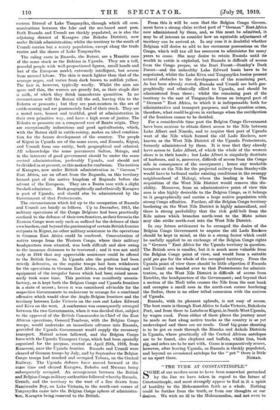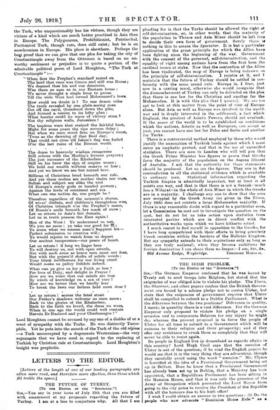"THE TURK AT CONSTANTINOPLE."
SOME of our readers seem to have been somewhat perturbed by the line we have taken in regard to the future of Constantinople, and most strangely appear to find in it a spirit of hostility to the Mohammedan faith as a whole. Nothing could be further from the truth, or from our thoughts or our desires. We wish no ill to the Mohammedan. and not even to
the Turk, who unquestionably has his virtues, though they are virtues of a kind which are much better practised in Asia than in Europe. The Polygamous, Prohibitionist, Patriarchal, Puritanical Turk, though rare, does still exist; but he is an anachronism in Europe. His place is elsewhere. Perhaps the befit proof that we can give that our plea for taking the city of Constantinople away from the Ottoman is based on no un- worthy sentiment or prejudice is to quote a portion of the admirable political poem of Lord Houghton, "The Turk at Constantinople" :— " When first the Prophet's standard rested on The land that once was Greece and still VMS Rome; We deemed that his and our dominion Was there as sore as in our Eastern home : We never thought a single hour to pause Till the wide West had owned Mohammed's laws.
How could we doubt it ? To one desert tribe The truth revealed by one plain-seeing man Cut off the cavil, thundered down the gibe, And formed a nation to its lofty plan : What barrier could its wave of victory stem ? Not thy religious walls, Jerusalem !
The impious wars that stained the faithful host. Might for some years the ripe success delay ; But when we once stood firm on Europe's coast, 'Twas as the dawning of that final day,
That could not close till Islam's flag was furled O'er the last ruins of the Roman world. The• dome▪ to heavenly w• isdom consecrate
Still echoes with the Muslim's fervent prayers; The just successor of the Khaleefate Still on his brow the sign of empire wears ; We hold our wealth without reserve or fear ; And yet we know we are but tented here.
Millions of Christians bend beneath our rule, And yet these realms are neither theirs nor ours, Sultan and subject are alike the tool Of Europe's ready guile or banded powers; Against the lords of continent and sea What can one nation do, one people be ?
Therefore regardless of the moment's shame, Of wives' disdain, and children's thoughtless woe, Of Christian triumph o'er the Prophet's name, Of Russia's smile beneath her mask of snow : Let us return to Asia's fair domain, Let us in truth possess the East again !
Men of the West ! Ye understand us not, We you no more : ye take our good for Ill; Ye scorn what we esteem man's happiest lot— Perfect submission to creative will; Ye would rejoice to watch from us depart Our ancient temperance—our peace of heart.
Let us return ! if long we linger here Ye will destroy Us, not with open swords, Not with such arms as brave men must not fear, But with the poison'd shafts of subtle words : Your blank indifference for our living creed - Would make us paltry Infidels indeed.
What can ye give us for a Faith so lost ? For love of Duty, and delight in Prayer ?
How are we wiser that our minds are test By winds of knowledge on a sea of care ?
How are we better that we hardly fear To break the laws our fathers held most dear ?
Let us return ! across the fatal strait Our Father's shadows welcome us once more ; Back to the glories of the Khaleefate, Back to the faith we loved, the dress we wore, When in one age the world could well contain Hare& Er-Rasheed and your Charlemagne !"
Lord Houghton cannot be accused by any one of a dislike of or a want of sympathy with the Turks. He was distinctly Turco- phile. Yet he puts into the mouth of the Turk of the old regime —a Turk uncorrupted by a degenerate Westernism—the very arguments that we have used in regard to the replacing of Turkish by Christian rule at Constantinople. Lord Houghton's insight was prophetic.



































 Previous page
Previous page